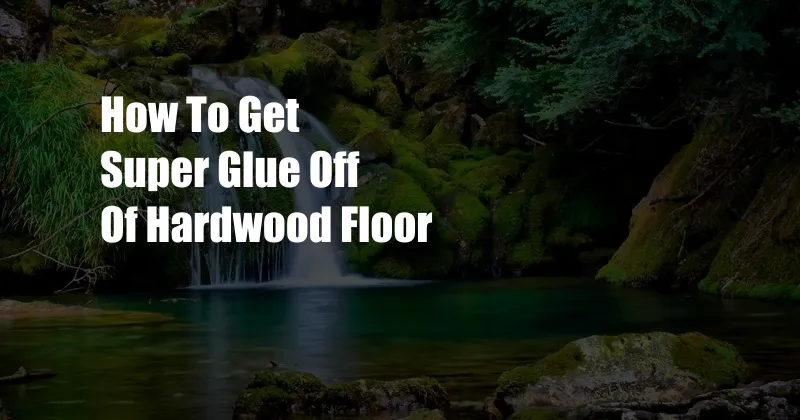
Super Glue: The Bane of Hardwood Floors
I remember the first time I spilled super glue on my hardwood floor. I was in a hurry to fix a broken vase, and I didn’t take the time to put down a drop cloth. Of course, the glue dripped right onto the floor, and I panicked. I tried to wipe it up with a paper towel, but it just made the mess worse. The glue had already started to set, and it was stuck fast to the wood.
I spent the next hour trying to remove the super glue from my floor. I tried everything I could think of, from acetone to WD-40. Nothing worked. Finally, I called a professional cleaner, and they were able to remove the glue without damaging the floor. But it was an expensive lesson learned.
What is super glue?
Super glue is a type of adhesive that is made from cyanoacrylate. Cyanoacrylate is a very strong adhesive that bonds to surfaces almost instantly. This makes it ideal for a variety of applications, from repairing broken objects to bonding wood together.
However, super glue can also be a problem if it gets on your hardwood floor. Cyanoacrylate is a very difficult adhesive to remove, and it can damage the finish on your floor if it is not removed properly.
How to remove super glue from hardwood floors
If you spill super glue on your hardwood floor, don’t panic. There are a few things you can do to remove the glue without damaging the floor.
- Act quickly. The sooner you try to remove the super glue, the easier it will be.
- Don’t use harsh chemicals. Harsh chemicals can damage the finish on your floor.
- Be patient. It may take some time to remove the super glue completely.
Here are a few methods you can try to remove super glue from hardwood floors:
- Acetone: Acetone is a solvent that can dissolve super glue. However, it is important to test acetone on a small area of your floor first to make sure it does not damage the finish.
- WD-40: WD-40 is a lubricant that can help to loosen the bond between the super glue and the floor.
- Goo Gone: Goo Gone is a commercial product that is designed to remove adhesive residue.
- Heat: Heat can help to soften the super glue, making it easier to remove. You can use a hair dryer or a heat gun to apply heat to the glue.
Sanding: If all else fails, you may need to sand the super glue off of your floor. However, this is a last resort, as sanding can damage the finish on your floor.
Tips and expert advice
Here are a few tips and pieces of expert advice for removing super glue from hardwood floors:
- Always test any cleaning solution on a small area of your floor first to make sure it does not damage the finish.
- Be patient. It may take some time to remove the super glue completely.
- If you are not comfortable removing the super glue yourself, you can call a professional cleaner.
With a little patience and effort, you can remove super glue from your hardwood floor without damaging the finish. Just be sure to act quickly and use the right cleaning solution.
FAQ
Q: What is the best way to remove super glue from hardwood floors?
A: The best way to remove super glue from hardwood floors is to use a solvent like acetone or WD-40. However, it is important to test the solvent on a small area of your floor first to make sure it does not damage the finish.
Q: Can I use heat to remove super glue from hardwood floors?
A: Yes, you can use heat to remove super glue from hardwood floors. However, it is important to be careful not to apply too much heat, as this can damage the finish on your floor.
Q: Can I sand super glue off of hardwood floors?
A: Yes, you can sand super glue off of hardwood floors. However, this is a last resort, as sanding can damage the finish on your floor.
Conclusion
Super glue can be a problem if it gets on your hardwood floor, but it is not impossible to remove. With a little patience and effort, you can remove super glue from your hardwood floor without damaging the finish. Just be sure to act quickly and use the right cleaning solution.
Are you interested in learning more about how to remove super glue from hardwood floors? Leave a comment below and I’ll be happy to answer your questions.